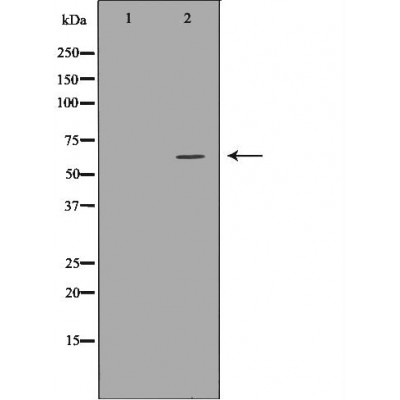Asparagine synthetase Antibody - #DF7398
| Product: | Asparagine synthetase Antibody |
| Catalog: | DF7398 |
| Description: | Rabbit polyclonal antibody to Asparagine synthetase |
| Application: | WB IHC |
| Cited expt.: | WB |
| Reactivity: | Human, Mouse, Rat |
| Prediction: | Pig, Zebrafish, Bovine, Rabbit, Dog, Chicken, Xenopus |
| Mol.Wt.: | 64kDa; 64kD(Calculated). |
| Uniprot: | P08243 |
| RRID: | AB_2839336 |
Related Downloads
Protocols
Product Info
*The optimal dilutions should be determined by the end user. For optimal experimental results, antibody reuse is not recommended.
*Tips:
WB: For western blot detection of denatured protein samples. IHC: For immunohistochemical detection of paraffin sections (IHC-p) or frozen sections (IHC-f) of tissue samples. IF/ICC: For immunofluorescence detection of cell samples. ELISA(peptide): For ELISA detection of antigenic peptide.
Cite Format: Affinity Biosciences Cat# DF7398, RRID:AB_2839336.
Fold/Unfold
asnS; ASNS_HUMAN; ASNSD; Asparagine synthetase [glutamine-hydrolyzing]; Asparagine synthetase; Cell cycle control protein TS11; Glutamine dependent asparagine synthetase 3; Glutamine dependent asparagine synthetase; Glutamine hydrolyzing; Glutamine-dependent asparagine synthetase; OTTHUMP00000024510; OTTHUMP00000204938; OTTHUMP00000204939; OTTHUMP00000204940; OTTHUMP00000204941; OTTHUMP00000204942; TS11; TS11 cell cycle control protein;
Immunogens
A synthesized peptide derived from human Asparagine synthetase, corresponding to a region within N-terminal amino acids.
- P08243 ASNS_HUMAN:
- Protein BLAST With
- NCBI/
- ExPASy/
- Uniprot
MCGIWALFGSDDCLSVQCLSAMKIAHRGPDAFRFENVNGYTNCCFGFHRLAVVDPLFGMQPIRVKKYPYLWLCYNGEIYNHKKMQQHFEFEYQTKVDGEIILHLYDKGGIEQTICMLDGVFAFVLLDTANKKVFLGRDTYGVRPLFKAMTEDGFLAVCSEAKGLVTLKHSATPFLKVEPFLPGHYEVLDLKPNGKVASVEMVKYHHCRDVPLHALYDNVEKLFPGFEIETVKNNLRILFNNAVKKRLMTDRRIGCLLSGGLDSSLVAATLLKQLKEAQVQYPLQTFAIGMEDSPDLLAARKVADHIGSEHYEVLFNSEEGIQALDEVIFSLETYDITTVRASVGMYLISKYIRKNTDSVVIFSGEGSDELTQGYIYFHKAPSPEKAEEESERLLRELYLFDVLRADRTTAAHGLELRVPFLDHRFSSYYLSLPPEMRIPKNGIEKHLLRETFEDSNLIPKEILWRPKEAFSDGITSVKNSWFKILQEYVEHQVDDAMMANAAQKFPFNTPKTKEGYYYRQVFERHYPGRADWLSHYWMPKWINATDPSARTLTHYKSAVKA
Predictions
Score>80(red) has high confidence and is suggested to be used for WB detection. *The prediction model is mainly based on the alignment of immunogen sequences, the results are for reference only, not as the basis of quality assurance.
High(score>80) Medium(80>score>50) Low(score<50) No confidence
Research Backgrounds
Research Fields
· Metabolism > Amino acid metabolism > Alanine, aspartate and glutamate metabolism.
· Metabolism > Global and overview maps > Metabolic pathways.
References
Application: WB Species: human Sample:
Restrictive clause
Affinity Biosciences tests all products strictly. Citations are provided as a resource for additional applications that have not been validated by Affinity Biosciences. Please choose the appropriate format for each application and consult Materials and Methods sections for additional details about the use of any product in these publications.
For Research Use Only.
Not for use in diagnostic or therapeutic procedures. Not for resale. Not for distribution without written consent. Affinity Biosciences will not be held responsible for patent infringement or other violations that may occur with the use of our products. Affinity Biosciences, Affinity Biosciences Logo and all other trademarks are the property of Affinity Biosciences LTD.


